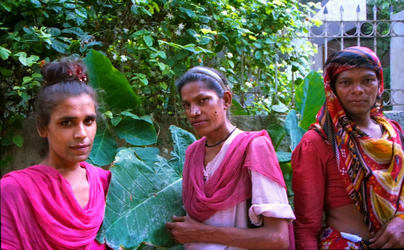India's Supreme Court enshrines 'the right of every human being to choose their gender'
CC BY: R Barraez D'Lucca


A free daily email with the biggest news stories of the day – and the best features from TheWeek.com
You are now subscribed
Your newsletter sign-up was successful
India's Supreme Court was roundly criticized for reinstating an 1861 ban on gay sex, so it may seem odd that the same high court just made India one of the foremost nations in recognizing transgender rights. The Indian Supreme Court not only created a legal "third gender" category, it also broadly declared that "it is the right of every human being to choose their gender."
The ruling applies only to transgender people, or hijra (a term that also encompasses transvestites/cross-dressers, and eunuchs), not gays and lesbians. But the justices asked the government to consider transgender Indians a "socially and economically backward" class — a classification that sounds like an insult but opens up the possibility of job and education quotas in line with other minority groups.
"Recognition of transgenders as a third gender is not a social or medical issue but a human rights issue," Justice K.S. Radhakrishnan said in his ruling. "Transgenders are citizens of this country and are entitled to education and all other rights." India's estimated two to three million transgender citizens recently were able to check "other" on the gender section of the voter registration form — 28,000 did for the current election — and now they are entitled to the same option on all government forms, plus separate restrooms and equal rights.
The Week
Escape your echo chamber. Get the facts behind the news, plus analysis from multiple perspectives.

Sign up for The Week's Free Newsletters
From our morning news briefing to a weekly Good News Newsletter, get the best of The Week delivered directly to your inbox.
From our morning news briefing to a weekly Good News Newsletter, get the best of The Week delivered directly to your inbox.
How do you square India's conservative laws on homosexuality and liberal embrace of transsexuality? It's partly a cultural thing. Nepal started recognizing a third gender in 2007, and Bangladesh followed suit last year. In fact, the BBC's Geeta Pandey suggests that the current stigmatization of transgender Indians was a British import. "Members of the third gender have played a prominent role in Indian culture and were once treated with great respect," she writes:
Their fall from grace started in the 18th century during the British colonial rule when the Criminal Tribes Act of 1871 categorized the entire transgender community as "criminals" who were "addicted" to committing serious crimes. They were arrested for dressing in women's clothing or dancing or playing music in public places, and for indulging in gay sex. After Independence, the law was repealed in 1949, but mistrust of the transgender community has continued. [BBC News]
The ruling was a win for transgender advocate (and film actress) Laxmi Narayan Tripathi, one of the plaintiffs in the case:
But it was also a victory against trying to fit complex cultures into narrow ideological categories.
A free daily email with the biggest news stories of the day – and the best features from TheWeek.com
Peter has worked as a news and culture writer and editor at The Week since the site's launch in 2008. He covers politics, world affairs, religion and cultural currents. His journalism career began as a copy editor at a financial newswire and has included editorial positions at The New York Times Magazine, Facts on File, and Oregon State University.
-
 Political cartoons for February 10
Political cartoons for February 10Cartoons Tuesday's political cartoons include halftime hate, the America First Games, and Cupid's woe
-
 Why is Prince William in Saudi Arabia?
Why is Prince William in Saudi Arabia?Today’s Big Question Government requested royal visit to boost trade and ties with Middle East powerhouse, but critics balk at kingdom’s human rights record
-
 Wuthering Heights: ‘wildly fun’ reinvention of the classic novel lacks depth
Wuthering Heights: ‘wildly fun’ reinvention of the classic novel lacks depthTalking Point Emerald Fennell splits the critics with her sizzling spin on Emily Brontë’s gothic tale
-
 ABC News to pay $15M in Trump defamation suit
ABC News to pay $15M in Trump defamation suitSpeed Read The lawsuit stemmed from George Stephanopoulos' on-air assertion that Trump was found liable for raping writer E. Jean Carroll
-
 Judge blocks Louisiana 10 Commandments law
Judge blocks Louisiana 10 Commandments lawSpeed Read U.S. District Judge John deGravelles ruled that a law ordering schools to display the Ten Commandments in classrooms was unconstitutional
-
 ATF finalizes rule to close 'gun show loophole'
ATF finalizes rule to close 'gun show loophole'Speed Read Biden moves to expand background checks for gun buyers
-
 Hong Kong passes tough new security law
Hong Kong passes tough new security lawSpeed Read It will allow the government to further suppress all forms of dissent
-
 France enshrines abortion rights in constitution
France enshrines abortion rights in constitutionspeed read It became the first country to make abortion a constitutional right
-
 Texas executes man despite contested evidence
Texas executes man despite contested evidenceSpeed Read Texas rejected calls for a rehearing of Ivan Cantu's case amid recanted testimony and allegations of suppressed exculpatory evidence
-
 Supreme Court wary of state social media regulations
Supreme Court wary of state social media regulationsSpeed Read A majority of justices appeared skeptical that Texas and Florida were lawfully protecting the free speech rights of users
-
 Greece legalizes same-sex marriage
Greece legalizes same-sex marriageSpeed Read Greece becomes the first Orthodox Christian country to enshrine marriage equality in law
